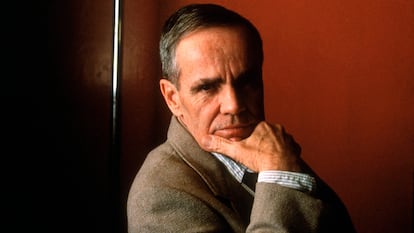Cormac McCarthy, the great novelist of the darkest America, has died
The author of ‘The Road’, who died Tuesday at the age of 89, was one of the most outstanding writers of his generation

American writer Cormac McCarthy has died at the age of 89. His death was announced in a statement from his publisher, Penguin Random House, which did not give a specific cause. McCarthy explored the dark side of human nature in a dozen poetic and moving novels. Some of his outstanding novels include The Road, No Country for Old Men, The Passenger or Stella Maris.
Born in 1933 in Rhode Island, McCarthy held a somber vision of the human condition, which he conveyed in his works. It has been said that Cormac McCarthy is the best novelist his country has produced since William Faulkner. Notably, his work No Country for Old Men was taken to the screen by the Coen brothers. In it, Javier Bardem plays a role that won him an Oscar for best supporting actor.
Secretive, solitary, jealous of his privacy to the extreme, Cormac McCarthy is part of the circle of legendary oddballs on whom, despite their disdain, most of what the vast majority of their colleagues covet have rained down: money, fame, attention, the veneration of the public and the media. Like J. D. Salinger or Thomas Pynchon before, Cormac McCarthy wrote with his back turned to his readers, ignoring fashions and commercial demands, faithful only to his calling.
Until shortly before his 60th birthday he was dirt poor. He traveled in a rickety van, wrote in motel rooms, and none of his titles sold much more than a couple of thousand copies, despite several masterpieces among them. In How to Read and Why, Harold Bloom states that Blood Meridian (1985) is the best American novel of the second half of the twentieth century. Published a few years earlier, in 1979, Suttree, a work that contains autobiographical elements and took the author 20 years to complete, is not far behind.
With the release of All the Pretty Horses (1992), the first volume of a trilogy on the border, the novelist’s life took an unexpected turn. He began to receive awards, his books sold in the millions, and Hollywood began to court him. Urged on by his agent, he gave the first interview of his life. Uncomfortable with his fame, many of his fans felt betrayed, and it is true that although the literary merit of the trilogy is undeniable, by entering a brighter zone McCarthy’s work lost some of its force. Cities of the Plain, the last volume of the trilogy, was published in 1998.
Subsequently, McCarthy published two other novels: No Country for Old Men (2005) and The Road (2006). With The Road, a story set in a post-apocalyptic future in which the United States appears as a country inhabited by survivors engaged in nefarious practices such as cannibalism, Cormac McCarthy won the Pulitzer Prize and an invitation to appear on Oprah Winfrey’s television program. McCarthy gladly accepted. Something seemed to change at age 75 in the hitherto elusive writer’s attitude. On the night of the Oscar gala where No Country for Old Men triumphed, he was accompanied by his eight-year-old son.
He was happy to share the success with the Coen brothers and Javier Bardem. After all, the most successful film at the 80th edition of the awards was based on his book. And that was only the beginning. The Road was also made into a film. Directed by John Hillcoat, it starred Viggo Mortensen, Charlize Theron and Robert Duvall.
After that, he went 16 years without publishing. In that time, McCarthy - his longest dry season since he began publishing in 1965 with The Orchard Keeper - was busy writing a screenplay, The Counselor (2013), a Ridley Scott narco movie that fell far short of his literary achievements, and an essay on the origin of language published in a scientific journal called Nautilus.
He returned in 2022 with his last two books, The Passenger and Stella Maris. Sometimes macabre and excessive, but always accurate in his portrayal of the dark side of the United States, his death marks the departure of one of the last great novelists of his generation.
Sign up for our weekly newsletter to get more English-language news coverage from EL PAÍS USA Edition
Tu suscripción se está usando en otro dispositivo
¿Quieres añadir otro usuario a tu suscripción?
Si continúas leyendo en este dispositivo, no se podrá leer en el otro.
FlechaTu suscripción se está usando en otro dispositivo y solo puedes acceder a EL PAÍS desde un dispositivo a la vez.
Si quieres compartir tu cuenta, cambia tu suscripción a la modalidad Premium, así podrás añadir otro usuario. Cada uno accederá con su propia cuenta de email, lo que os permitirá personalizar vuestra experiencia en EL PAÍS.
¿Tienes una suscripción de empresa? Accede aquí para contratar más cuentas.
En el caso de no saber quién está usando tu cuenta, te recomendamos cambiar tu contraseña aquí.
Si decides continuar compartiendo tu cuenta, este mensaje se mostrará en tu dispositivo y en el de la otra persona que está usando tu cuenta de forma indefinida, afectando a tu experiencia de lectura. Puedes consultar aquí los términos y condiciones de la suscripción digital.








































